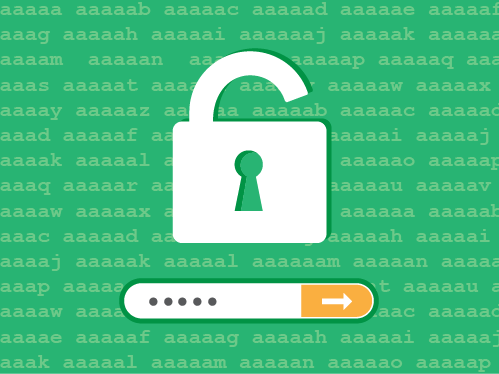Hackers Can Steal Your Passwords, How?
Facebook is one of the largest social media sites in the world. It was recently targeted by hackers and data of more than 50 million users was compromised.
When a tech giant like Facebook is not safe, it really makes you wonder, who is? That is the power hackers have today. Using sophisticated tools and necessary knowledge, hackers can bring large organizations to their knees. This is the reason cybercrime is expected to cost $6 trillion worldwide by the end of 2021.
The primary target for hackers in any attack is the password of the account in question. According to research by Microsoft, each user has about 25 different accounts and an average of 8 passwords they type every day. Their passwords are to a variety of different accounts ranging from a simple educational resource website to ecommerce and bank accounts. Each password is of importance and hackers target these frequently.
The reason why passwords get hacked
A password is essentially a key that you use to access your most sensitive information. With your password, a hacker will be able to steal a substantial amount of data which can cause significant harm to the person the password belongs to. D
epending on the password which is stolen, users are vulnerable to identity theft, false impersonation, and financial losses. We live in uncertain times and having your identity stolen can mean that the risks levels are enormous. The information can be used to frame a random innocent person for a heinous crime they can’t even think about.
Another reason for password hacking is user negligence. We make a grave mistake. Since we have so many accounts and it is difficult to remember the password to each and every one of them, we resort to using weak passwords. A recent survey highlighted that only 35 percent of people have strong passwords on their accounts.
This means that the rest are just sitting ducks and when a hacker comes around snooping for this information, they’ll be the first to lose their data. The lackluster response by consumers to the idea of setting strong passwords in a big reason for password hacking.
Be very careful on social media
The ineffective use of social media is becoming a reason for most of our problems. Since we spend a good part of our day scrolling through Facebook and Instagram newsfeeds, we inadvertently share a lot of information there. These things can be used in case there is a breach of our accounts. Most websites today allow users to signup using Google or other social media accounts. In order to ease our lives, we opt for this provision. While it does make our life easier, it does the same for hackers. If they gain access to one account, they can enter every account linked to it.
A recent study by Thycotic, a US-based firm, revealed that this social media dependence is a big cause for cybercrimes. Since we already find one password difficult to keep in mind, a vast majority doesn’t activate two or multi-factor authentication. As a result, the risk levels jump considerably. Reusing similar passwords or weak ones make them easier to guess resulting in hackers having a field day with such accounts. Social media might have made our lives easier but our awkward usage of the platforms has turned them into a nuisance too.
Ways passwords can get hacked
There are several ways in which passwords can be stolen by attackers. The method used can vary. A hacker might analyze the expertise and equipment that they have to ascertain which method they are going to use.
- Brute force attacks: This is the most common way we are all familiar with. Hackers use trial and error using the information they might have gathered about users to get into their account. Now, there are sophisticated systems which can run tens of password through your account every minute until one fits the bill,
- Shoulder surfing: This is exactly what the name indicates. Hackers can be spying over your shoulder and observing as you enter your password. Once they’ve seen it, reentering it is the easy part,
- Keyloggers: This is a virus which can sit deep within your system, undetected. Its purpose is to log every keystroke being made on the system henceforth. Using the key logs and a little bit of common sense, hackers can figure out when and where a password is entered,
- The angle of tilt on your phone: Believe or not but according to the cyber specialists at Newcastle University, this is entirely possible. All you have to do is enter a fake website created by a hacker. Now your phone and its physical activity are being monitored using the gyroscope and other sensors embedded in the device. There are no permissions required to carry our said act. The research found that using this method it is possible to crack a 4-digit PIN with 70% accuracy.
There are many other ways in which a password might be hacked. This can include spidering where the virus just crawls into the system and picks up vital information. This method is more commonly used for corporate identities and to hack Wi-Fi networks.
A bit about Man in the Middle
Man in the middle is one of the most common and talked about cyber-attacks. Hackers have the ability to intercept communications between two parties and insert themselves in the middle to get a hold of private information which might be shared across the platform.
There are numerous ways in which a hacker can put themselves in between the communication channel. They can design legitimate looking webpages which ask for certain information. Also, through false impersonation of the other person, you can be asked to fill in a survey or other instruments which gives out your personal information for different purposes.
Can brainwaves be used for stealing data?
As technology evolves with leaps and bounds, the ways in which data can be stolen grow too. Hackers cannot only guess passwords but also create artificial networks and carry out other activities which bring harm to other users. As absurd as it may sound, but brainwaves can also be used to decipher a password as well.
These findings were part of research conducted by the University of Alabama. Apparently, the waves of brain activity can give out a lot of information regarding you and what you’re doing online.
Tracking brainwaves require an electroencephalograph (EEG). This is a chart which shows the levels of activity at each time and it allows physicians to understand behavior trends. There are EEG headsets available on the market which have embedded sensors to monitor this information. This technology is primarily used in medical research but unfortunately, hackers have found a way to use this in their favor.
As the usage increases, so does the potential applications. Gaming headphones and robotic toys have EEG sensors embedded in them. The study went on to state that if such a headset was worn while entering any password especially that to a bank account, it can be stolen.
Man-in-the-middle attack on public WiFi
Public Wi-Fis are the most susceptible place for a man-in-the-middle attack. These networks are open to the general public and are not consciously monitored. When a hacker is connected to such a network, they can see all the devices which are sharing it as well. This gives them the ability to target a certain device and interfere with its communications. State of the art tools which allow a hacker to do it.
Once they have placed themselves in the middle strategically, they are able to start extracting the information they came for. Through phishing and other schemes, it is now very easy to gain sensitive data about clients.
The way forward
One of the biggest reasons for data hacking and why these elements can gain access to it so easily. This is because the traffic and communications are not encrypted and protected by a safe and reliable program. Yes, it is possible to do so using a VPN.
These services allow users to make themselves anonymous over the internet which means that they can save their browsing sessions and other private information from going public and being misused. What’s more, is that reliable Wi-Fis have features which can protect against Wi-Fi breaches and other similar threats too.
As far as an anonymous VPN go, one of the most credible services is Ivacy. They are a service provider based in Singapore. The company provides users the ability to connect to more than a thousand servers in various countries. It uses a 256-bit encryption protocol to conceal any traffic from spying eyes.
The ‘internet kill switch’ function cuts off the internet connection in case the VPN stops functioning. The speeds provided by Ivacy are also quite strong and these perks have been able to win them wide acclaim from users and other organizations. However, while Ivacy can protect you against all else, there is nothing it can do about someone standing over your shoulder and spying on you.











